Sophon’s Social Oracle: how zkTLS serves as the foundation for consumer crypto
This article explores zkTLS, a technology that enables secure data sharing, suitable for consumer crypto. We'll dive into how it functions, its implementations, and how Sophon's Social Oracle leverages zkTLS to build a consumer ecosystem that improves user experiences.

Executive Summary
This article explores zkTLS, a technology that enables secure data sharing, suitable for consumer crypto. We'll dive into how it functions, its implementations, and how Sophon's Social Oracle leverages zkTLS to build a consumer ecosystem that improves user experiences and offers new ways to think about applications.
zkTLS isn't just another privacy technology – it's the bridge that brings Web2 user data into Web3 without compromising privacy, creating the foundation for truly mainstream crypto adoption. By enabling secure verification of off-chain achievements and credentials, zkTLS serves as the perfect trojan horse for bringing crypto to consumers who don't even realize they're using blockchain technology.
Sophon's Social Oracle is a data hub that verifies and brings online achievements, reputation, and social influence onchain without revealing personal data. It transforms scattered individual actions into collective intelligence, enabling applications to unlock trust-minimized, privacy-preserving proofs of engagement at scale.
As zkTLS enables more users to securely share verified data, this Social Oracle becomes increasingly powerful. This growing reservoir of authenticated information powers a new ecosystem where applications can offer personalized experiences based on users' verifiable history – without ever accessing their sensitive details. This critical mass of data will unlock possibilities for builders that simply don't exist anywhere else in the crypto landscape.
For the first time, users gain true control over their digital identity and achievements. Your online accomplishments – gaming milestones, financial credentials, social influence – become assets you can selectively monetize and leverage across the ecosystem. Sophon accounts allow users to aggregate their fragmented online identity into a comprehensive, privacy-preserving profile that finally reflects who they truly are and delivers tangible benefits for their digital footprint.
Sophon isn't positioning itself as just another blockchain – it's building the comprehensive platform that will break crypto out of its current echo chamber. By partnering with the very best builders and focusing on genuine user experiences, Sophon is creating an ecosystem where mainstream users can access the benefits of blockchain without the traditional barriers that have limited adoption.
Crypto Is Limited Without Private Data
One of the primary challenges in consumer crypto is the significant limitation on data privacy, particularly in managing personal data. While crypto's transparent design and philosophy allow anyone to view transactions or actions, this transparency is not inherently problematic. However, the difficulty lies in securely handling personal data, such as gaming achievements or financial status, without compromising private, sensitive information.

The problem is that the crypto space (and consumer space) is limiting itself from a wide variety of use cases because it's difficult to import personal data onchain to allow custom experiences for users. Currently, there are only oracle networks oligopolized by a few big companies that constantly post public data from the outside world onchain, which are often prices of different assets.
Certainly, there are other use cases, such as:
- Providing public price feeds of different stocks for tokenized assets
- Providing public weather data or internet connection speed for DePIN
- Verifying public data when making a bet, like on Polymarket.
We definitely need more use cases than just knowing the prices of tokens! What if a user wants to prove they played 3000 hours in Counter-Strike to qualify for a beta pass for a new game?
Steam login details must stay private, and users need a way to prove ownership without exposing sensitive data. At Sophon, we tried using oracle tech to keep data private while allowing onchain verification. But server authentication, based on session keys, isn't built to provide proof that third parties can verify to ensure data stays private.
Using TLS to Handle Private Data
Everyone reading this article right now is using TLS without even realizing it. If you look at your browser's link, you will see "https://" at the beginning of the link. If you tried accessing a website with "http://" at the beginning (without the 's'), your browser would warn you that you're entering a website where the connection is not secure.
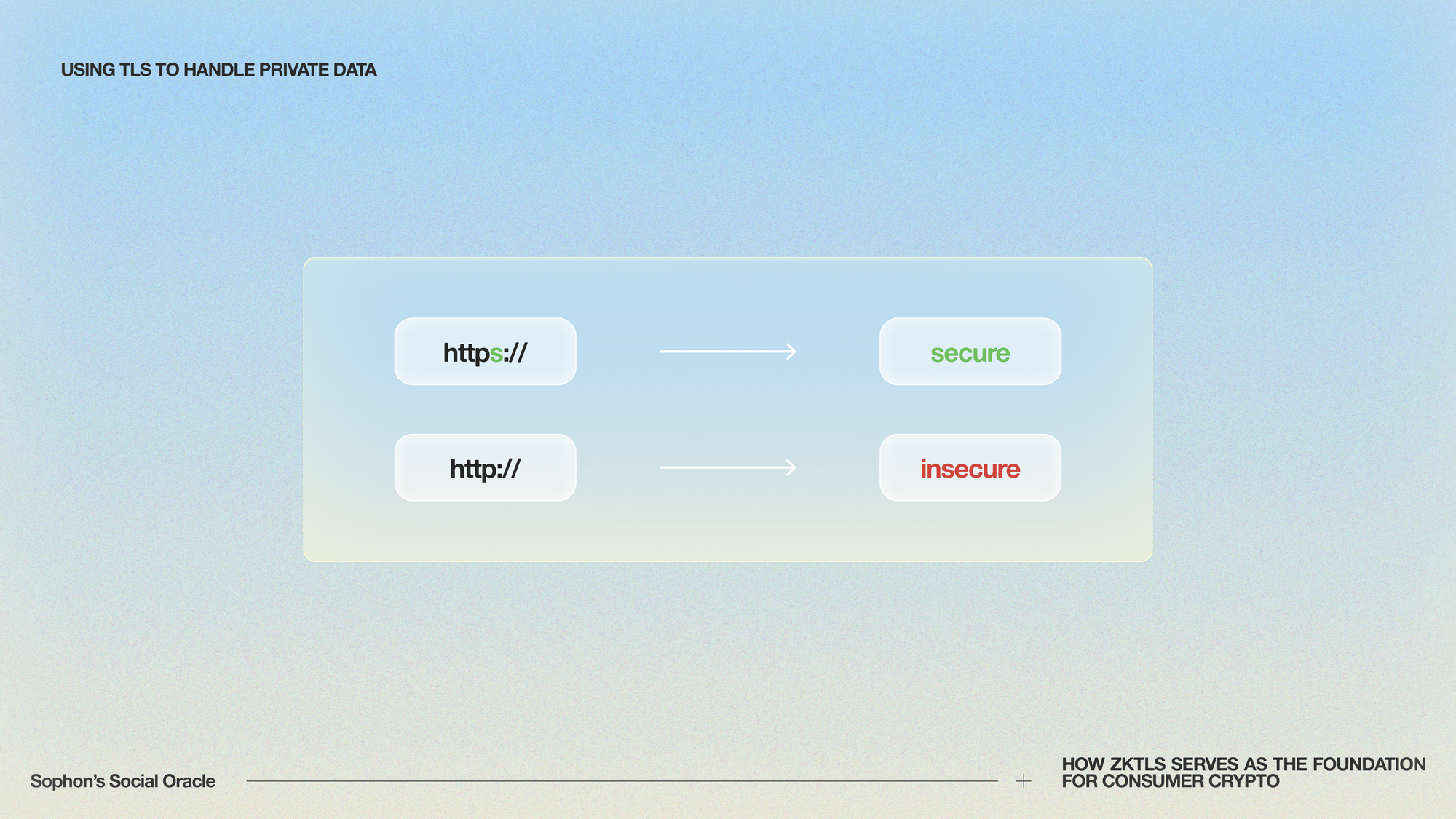
Can We Use TLS for Sending Private Data in Consumer Crypto?
No, TLS enables secure communication between two parties but does not allow verification of the data's authenticity to a third party. While TLS ensures privacy during transmission, it cannot prove the data's integrity or origin onchain, as servers don’t sign responses. Clients could modify data locally, and openly sharing responses risks compromising privacy. So, how can we ensure users can securely share private data in consumer crypto?
zkTLS: A Verifiable Enhancement of TLS
We like TLS, but unfortunately, it doesn't fit in consumer crypto due to the reasons outlined above. zkTLS, a reimagined version of TLS where 'zk' stands for 'zero-knowledge,' enables users to share only the private data they choose without exposing sensitive information.
Typically, confirming basic facts involves using a dedicated API or sharing excessive personal details. You have certainly encountered many cases like these in real life:
- Sharing your entire passport when you only want to prove you're of legal age
- Sharing an entire bank statement when you only need to confirm your income
- Connecting a whole Steam account when you only need to prove you have a specific item in your inventory.
This complicates secure data sharing across platforms and risks privacy. zkTLS allows data to be shared from any website while reducing the privacy concerns tied to sharing more than needed. zkTLS enables the generation of verifiable proof of data exchanged between a server and client through TLS, adapting the TLS framework to support secure private data sharing in crypto. Below, you can see the diagram and description explaining the simple flow of how zkTLS works.
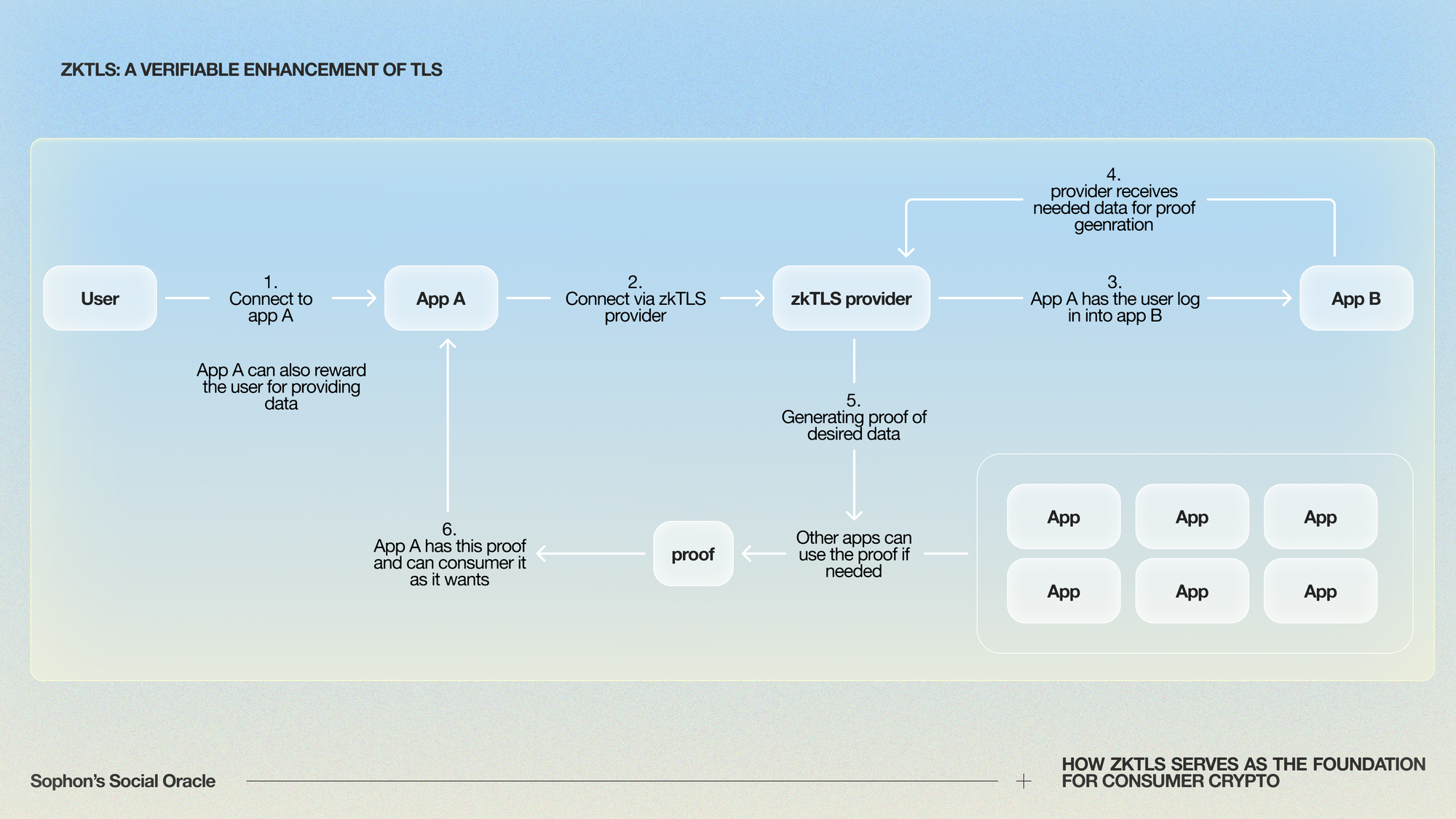
- A user connects to App A, which requires data from App B.
- App A prompts the user to authenticate with App B via a zkTLS provider.
- The zkTLS provider generates a zero-knowledge proof of the requested data.
- App A receives the proof and processes it as needed, either off-chain or onchain.
- At this stage, App A may reward the user for sharing the data.
Typically, the proof is exclusive to App A and not shared with other applications. However, depending on the broader system implementation, other apps may have the capability to utilize this proof.
This is the general flow of how zkTLS works; however, there are different approaches to zkTLS that vary in how this proof of the data's correctness is crafted.
What Are the Different Types of zkTLS and Why Are They Needed?
There isn't a single standard for zkTLS because it is an approach to the verifiability of private data rather than a unified technology. The task of securely sharing private data without exposing it can be viewed from multiple angles, each with its own trade-offs.
zkTLS extends the standard TLS protocol with proofs, but what these proofs are, how they're generated, and how they're used is a whole different field for optionality and experimentation. We value optionality greatly at Sophon, as it helps create a diverse ecosystem where every developer or user can find their preference in different applications.
There are currently three primary implementations available for zkTLS providers to utilize:
- MPC-TLS (Multi-Party Computation)
- TEE-TLS (Trusted Execution Environment)
- Proxy-TLS
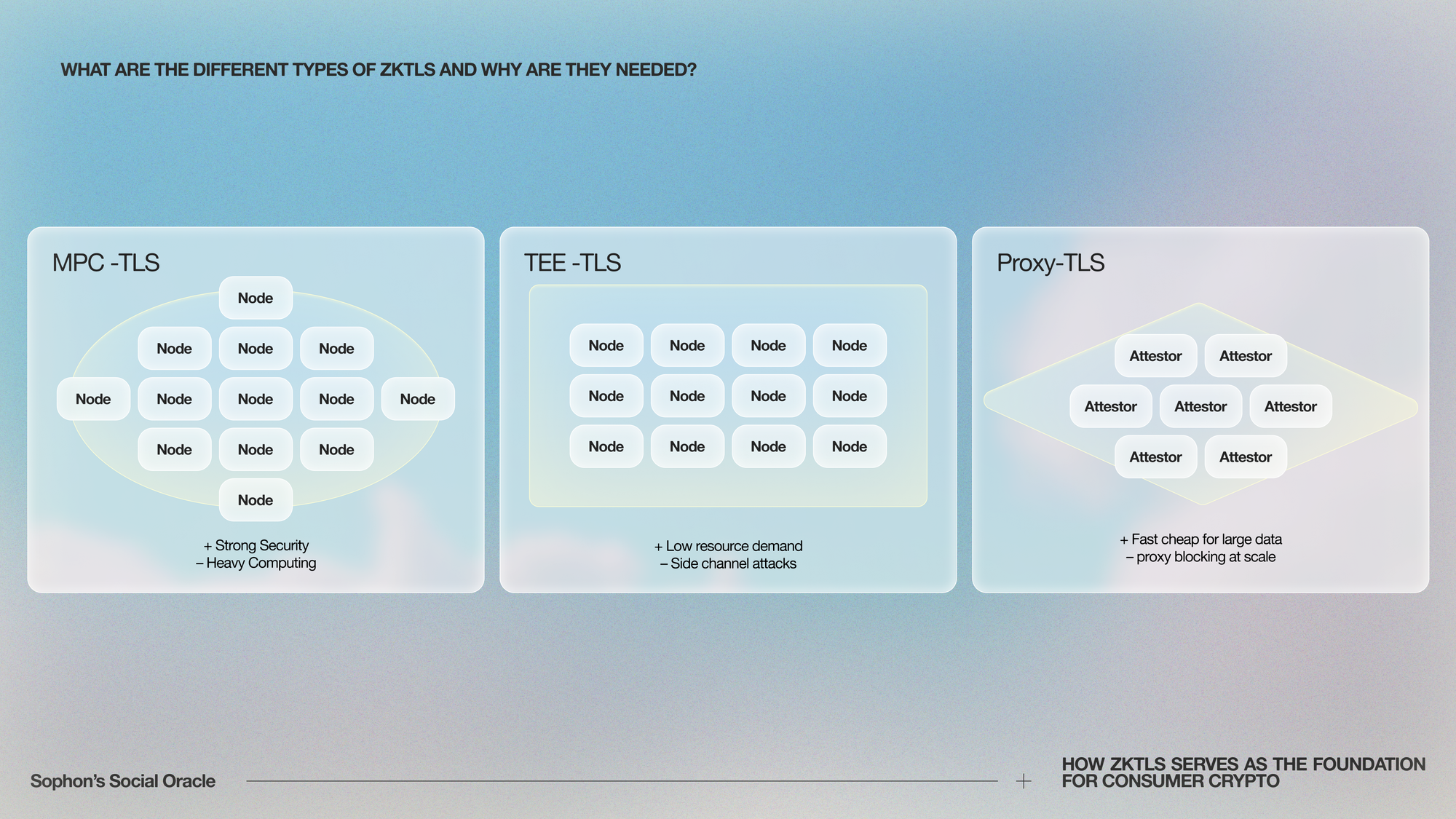
MPC-TLS ensures secure handshakes (connection between client and server) without any single party holding private keys, offering strong security and potential decentralization. However, it demands significant computational and networking resources and carries the risk of collusion, where a threshold number of parties (e.g., a majority or a specific number) could collude to undermine the protocol's security, privacy, or integrity.
Proxy-TLS employs a trusted proxy to forward encrypted TLS traffic between the client and server. The proxy cannot access the encrypted content, as it lacks session keys, but it can verify and sign messages to confirm their authenticity. This method is computationally efficient, cost-effective, and capable of handling large data volumes. However, it is susceptible to man-in-the-middle attacks, which can alter communication, and faces challenges with proxy detection and blocking at scale.
TEE-TLS uses hardware enclaves for secure, efficient handshakes with low resource demands, suitable for low-latency settings without needing a third party. Still, it faces risks from side-channel attacks and depends on trusted hardware providers.
There is no perfect solution, as each is suited to different use cases and applications. Moreover, Sophon is not limited to a specific zkTLS model. We want to discuss our vision for integrating zkTLS into Sophon, but first, why zkTLS?
Vision of Sophon
We are fundamentally a product-focused team, driven by a simple truth that most crypto projects miss: consumers don't care about blockchain – they care about what it enables.
The current onboarding paradigm in crypto is completely backward. Users are forced to navigate a maze of technical barriers – wallets, seed phrases, gas fees – before experiencing any actual benefit. This is equivalent to forcing Netflix users to configure AWS settings before watching a show, or requiring Instagram users to understand database architecture before posting a photo.
With zkTLS at our core, Sophon flips this model entirely. Users start with familiar, frictionless experiences and immediately access the benefits that matter: exclusive rewards, ownership of digital assets, and personalized experiences that recognize who they are across the entire ecosystem.
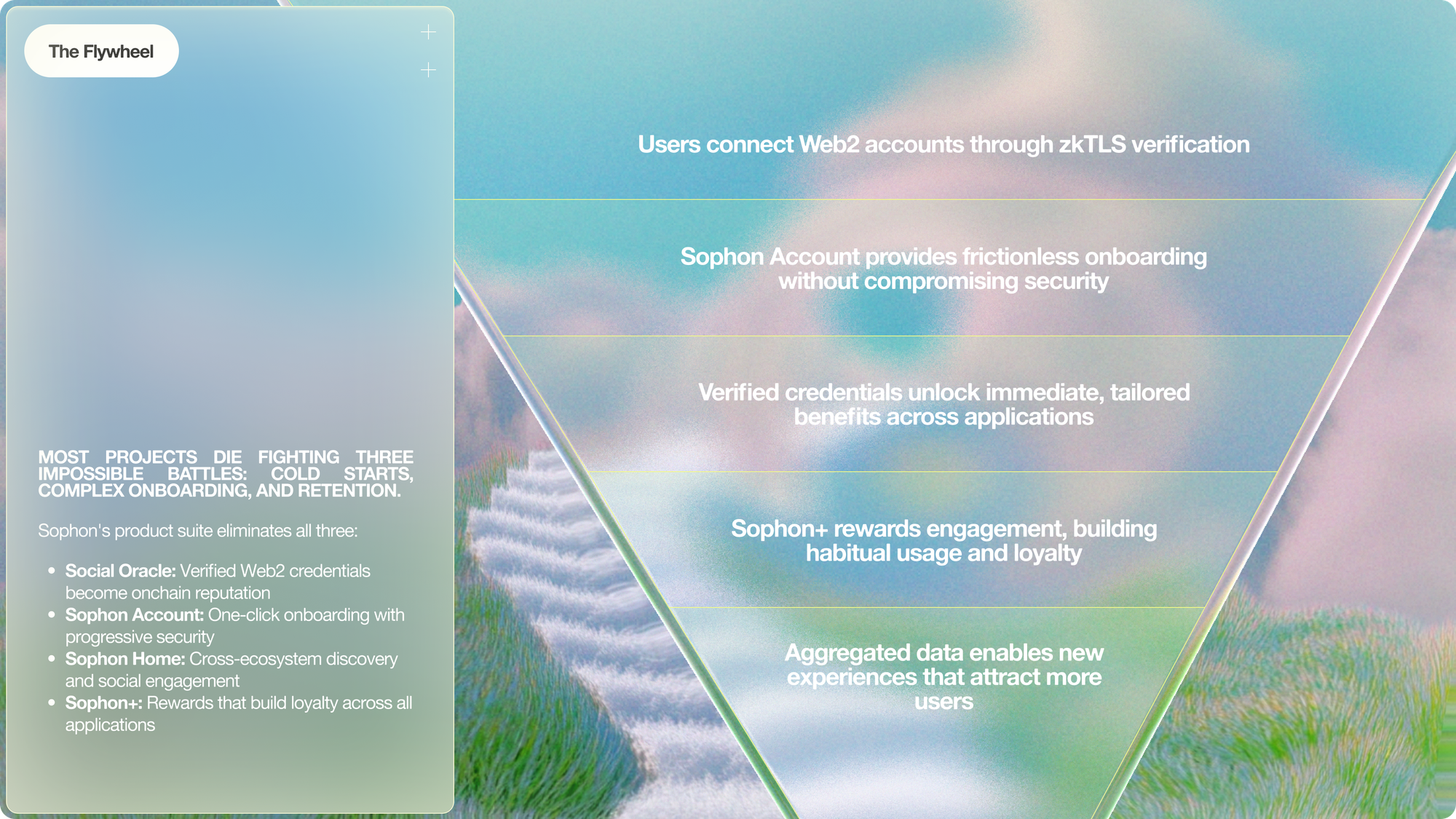
Imagine joining a gaming platform that automatically unlocks special items based on your achievements elsewhere, or a music platform that rewards you for proven fandom without requiring you to rebuild your profile from scratch. This is the seamless, value-first experience that Sophon delivers.
Unlike most projects that ask users to care about technology for technology's sake, we're building experiences where the technology disappears. Users interact with applications, not infrastructure. They collect rewards, not tokens. They build reputations, not wallets.
This vision – where onboarding feels as natural as signing up for any consumer app, but the benefits are supercharged by blockchain's unique capabilities – represents the future that Sophon is building. Because ultimately, mainstream adoption won't come from explaining blockchain better; it will come from making blockchain invisible while making its benefits unmissable.
We Are Not Limited by zkTLS Providers
That is a very important point we want to make: Sophon is a platform, not a single solution. There are different approaches to zkTLS and multiple providers, however, Sophon is not limited to adopting only one zkTLS provider or approach.
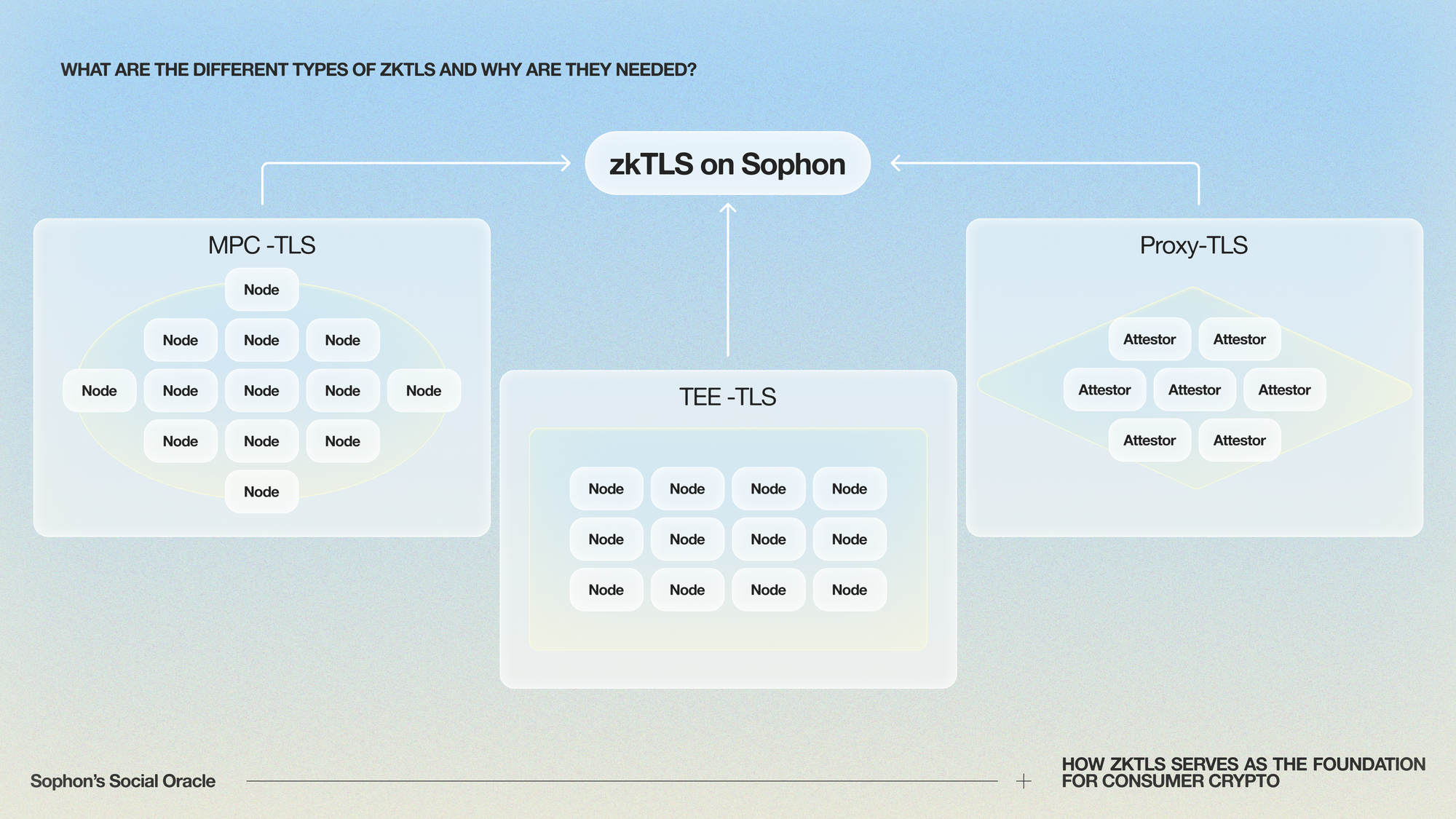
In our model, we aim to integrate every zkTLS provider, so apps in the Sophon ecosystem can choose which solution they want to integrate based on the specific features of the zkTLS provider they need. zkTLS is the main part of one of the core components of the Sophon ecosystem, and this component is called Social Oracle. It represents how consumer data is used on the platform using zkTLS, and this is a very important topic.
Social Oracle: The Trust Layer That Makes Consumer Crypto Work
Sophon’s Social Oracle is the trust layer that makes genuine consumer crypto possible. It's a system that verifies and brings online achievements, reputation, and social influence onchain without revealing personal data. While other platforms focus mainly on financial transactions, Sophon prioritizes what actually drives engagement: identity, reputation, and social connections.
Imagine a digital passport that proves your gaming achievements without exposing accounts, verifies spending habits to unlock rewards without sharing financial data, and confirms social influence without revealing personal connections. This is what Social Oracle enables – unified layer of verified credentials that travel with you across the entire ecosystem.
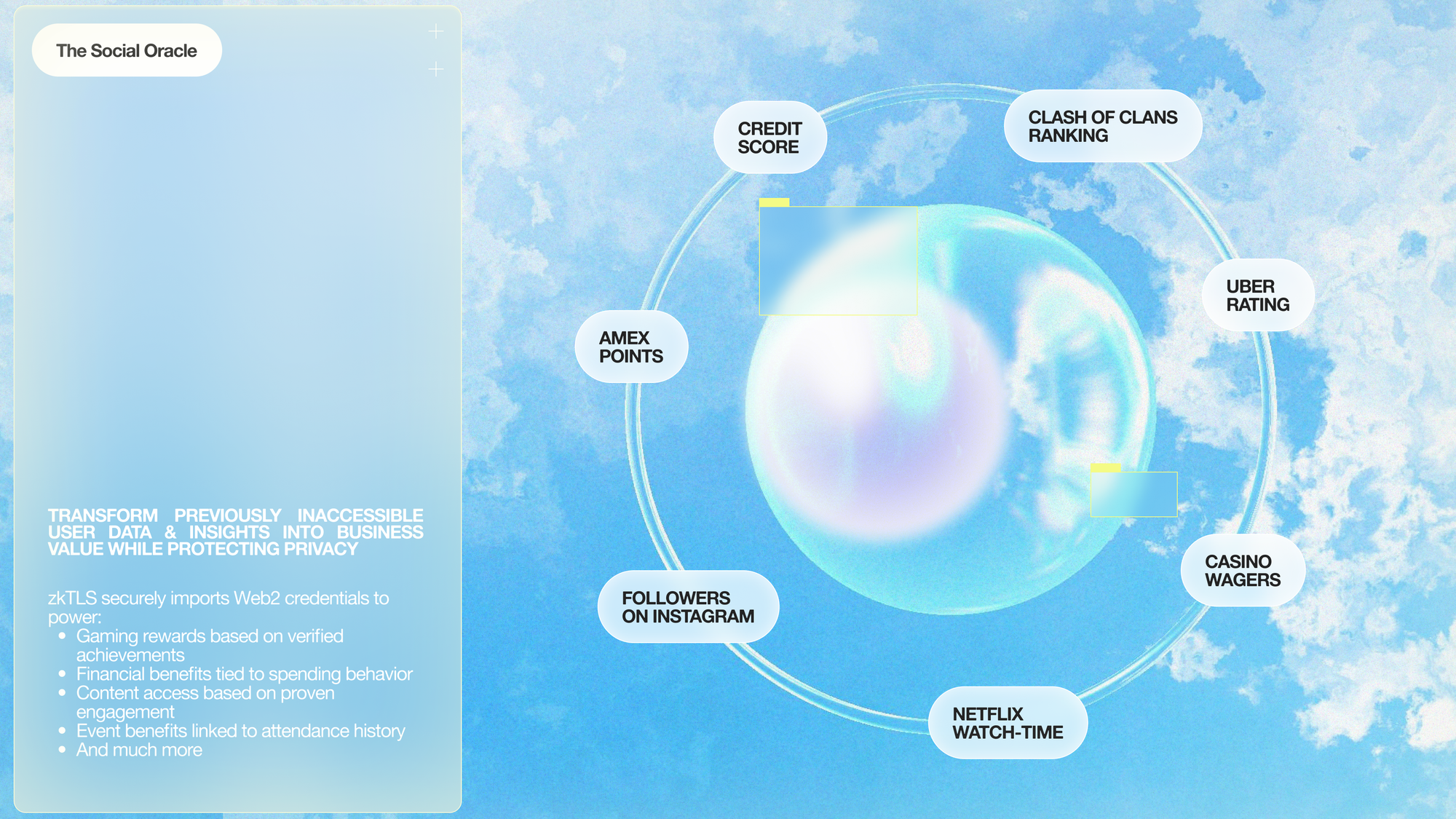
For users, this means seamless experiences with immediate recognition of your status across all Sophon applications. Your digital footprint becomes an asset you control, not something extracted from you.
Developers gain instant access to verified user data without building complex authentication systems, protection against sybil attacks, and rich targeting capabilities – all without privacy violations. They can tap into Sophon's growing user base rather than starting from zero with each new application.
The power of the Social Oracle comes from aggregation. As more users connect credentials and more applications join the network, the system creates a virtuous cycle that siloed applications cannot match. This is why we call it an "oracle" – it transforms individual signals into collective intelligence that powers entirely new classes of applications.
The Social Oracle is integrated into virtually all processes of Sophon: obtaining product data, structuring incentives around it, and serving as the main source of trust and social validation.
How Are Social Oracle and zkTLS Related?
zkTLS is the main component of the Social Oracle. It addresses the core problem of securely bringing private data into web3, while the Social Oracle takes this raw secured data and transforms it into meaningful insights that power user experiences.
Imagine a tree as an analogy. The trunk represents zkTLS, the core foundation that supports the growth of branches and leaves. The branches symbolize users who share their private data via zkTLS, forming the platform's community. The leaves on each branch reflect the personalized experiences, reputation scores, and achievements unique to each user. Together, this entire tree, consisting of the trunk, branches, and leaves, forms the Social Oracle.
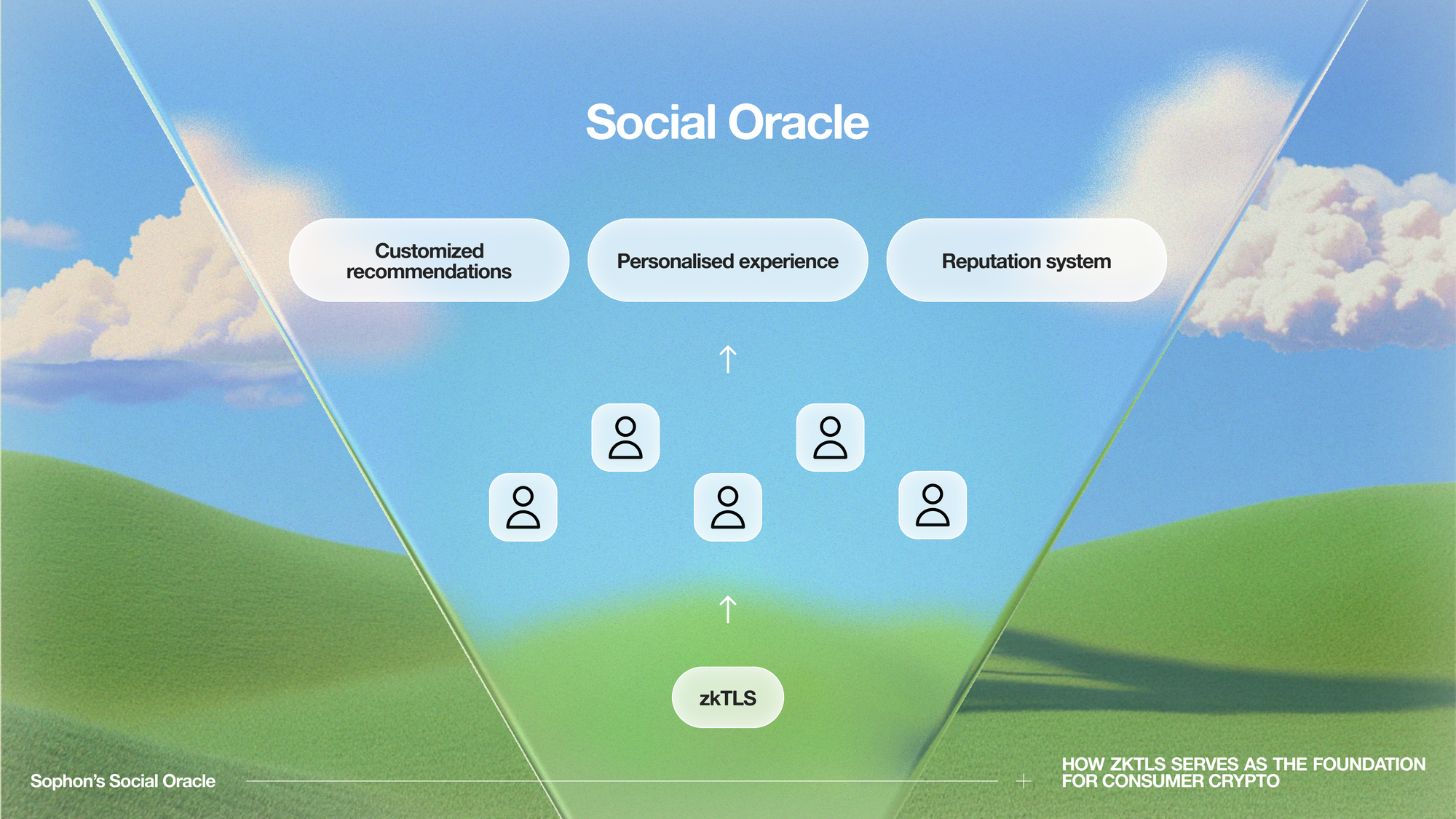
This structure isn't just technically elegant – it creates practical advantages that other approaches can't match. Because zkTLS handles verification at the protocol level, applications don't need to build their own verification systems. Because Social Oracle aggregates data across the ecosystem, users don't need to repeatedly verify the same credentials for different applications. And because the entire system is designed with privacy at its core, developers can build rich, personalized experiences without compromising user data.
The result is an ecosystem where your verified achievements actually matter, your reputation follows you seamlessly across applications, and your privacy remains intact – something that neither traditional Web2 platforms nor existing blockchain systems can deliver.
Incentives Shouldn't Be Just Money, They Should Be Fun
In web3, there is a clear incentive-alignment problem, where protocols simply buy users or TVL by offering token incentives for a certain period or forcing users to farm an airdrop. When the airdrop arrives or when protocols run out of incentive allocations, most users leave because they were only motivated by money, not by the experience.
This is also why most GameFi projects fail: the games are simply not fun to play. Traditional games and applications can thrive for decades, even if they’re no longer supported by developers, simply because they’re fun to play or extremely comfortable to use.
With Sophon’s Social Oracle, web2 user databases can be vampire-attacked through zkTLS with real, useful, and fun incentives, not just money from a pool that will eventually run out.
Why Can't Apps Do It Themselves? Why Do They Need Sophon?
It is easier for apps to be interoperable with each other if they’re on the same platform, similar to Google Suite, than when applications are fragmented. The same proof issued by one app regarding a user’s private data can be used in other applications if the user agrees to do so, in a simpler way.
Alternatively, there have been multiple attempts to create crypto consumer platforms, however, they face some limitations:
- Individual applications that implement privacy solutions for personal data operate in isolation, creating fragmented user experiences with repeated verification processes and no shared reputation system.
- Web3 consumer platforms lack native zkTLS integration, forcing users to either compromise privacy or navigate complex third-party verification.
- Standard oracle networks used by the majority of apps prioritize public data synchronization (like price feeds) but aren't designed for secure private data verification at the user level.
Sophon addresses these limitations by creating an ecosystem where verified data serves as the foundation for interoperable applications, eliminating redundant verification while preserving privacy.
An interesting product flywheel is possible in Sophon for all ecosystem participants:
- Users verify their web2 personal data in exchange for exclusive incentives.
- This private data is now available on Sophon in a secure way.
- As more data comes in, more verified user histories become available.
- Apps can use this data to drive engagement, build reputation systems, and launch crypto consumer products.
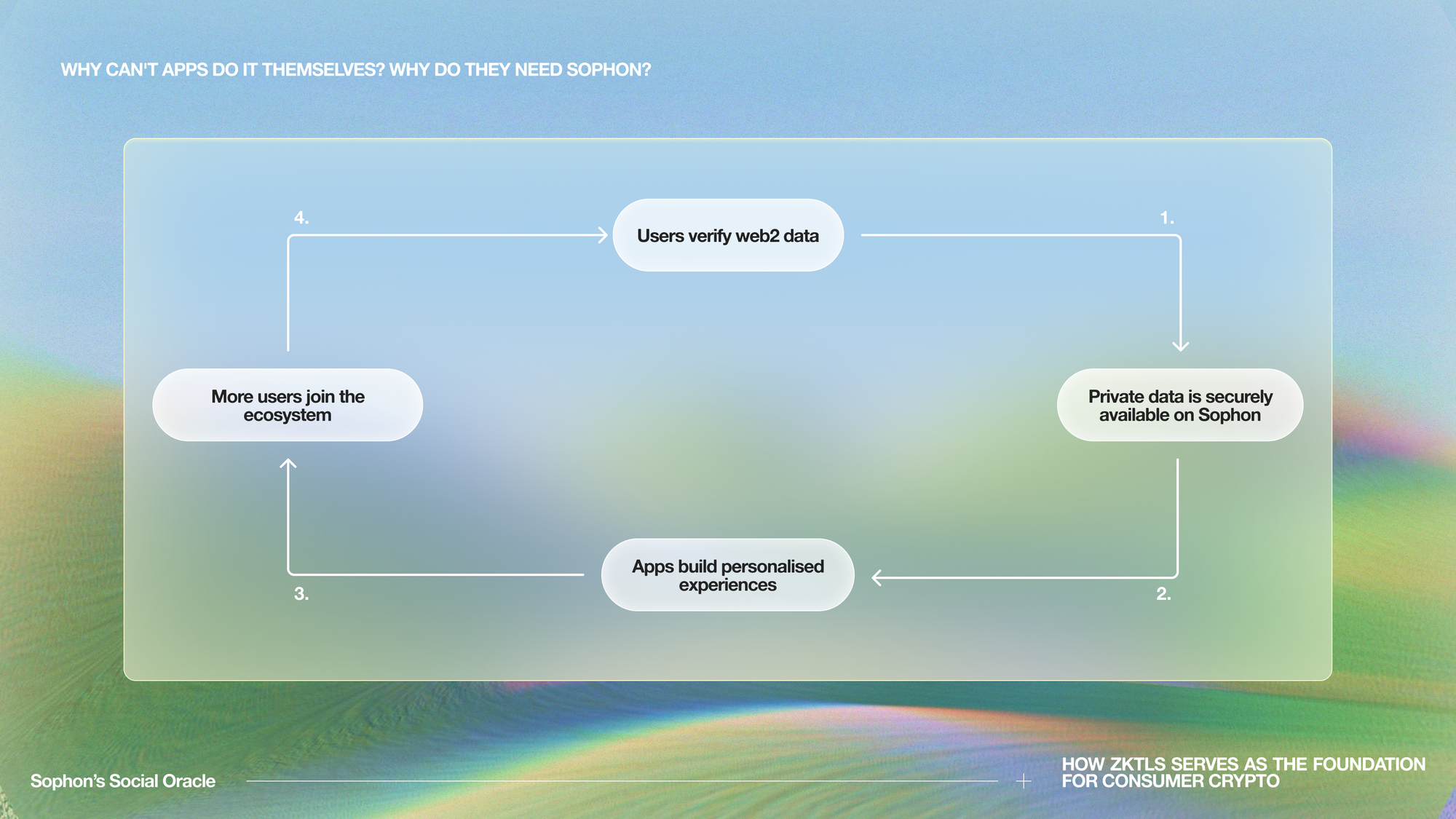
As more users join, more data flows in, and the number of quality applications grows as well. zkTLS ultimately serves as a main component of why this flywheel can be started. Consumer crypto applications that do not use zkTLS or are not part of a broader ecosystem don’t have these benefits, while apps on Sophon gain both: using zkTLS and being part of a growing ecosystem specifically designed for consumer crypto and onchain experiments.
Consumer Crypto and zkTLS
zkTLS is a perfect example of how a technology can be an ideal solution for any consumer application. At the same time, it enables onchain apps to enhance user acquisition and targeting with this data, creating more personalized digital experiences.

There are many use cases that can be utilized not only in consumer entertainment apps but also in DeFi or other verticals. All of this wouldn’t be possible without zkTLS because it’s difficult to import traditional data into web3 in a verifiable and secure way. Oracles are not suitable for this task because they publish public data that is always transparent and available. User data can be used securely and efficiently in Sophon, thanks to Social Oracles. All of these things are possible on Sophon:
- Verify your active Amazon Prime membership to unlock early access and unique incentives in a new consumer marketplace launching on Sophon.
- Demonstrate that you have over 10,000 airline miles to receive a discount when purchasing tokenized stock of airline companies without revealing personal information such as age, citizenship, or previous flight history—just miles.
- Prove that you have $100,000 on Robinhood to receive a yield booster on stablecoins for a specified period.
- A content creator authenticates their earnings across multiple platforms to unlock tiered rewards in a crypto-powered monetization system.
- Confirm that you have a certain level of engagement on CT to gain exclusive benefits in a new Web3 social network without revealing other sensitive information.
zkTLS is still a relatively new technology, but it is very promising and already gaining significant attention, not only from Sophon but from other ecosystems as well. We want to be at the forefront of this technology and integrate it deeply into the Sophon ecosystem so users can benefit from the privacy of their data, while apps can explore new use cases, personalize user experiences, and make applications truly usable and fun!
Future with zkTLS
As outlined in the previous section on use cases, zkTLS enables the creation of new products that can generate fresh revenue streams. Consumer crypto often requires sensitive data, but before zkTLS, there was no way to import it securely and verifiably. Now, there is. As a relatively new technology, zkTLS is exciting, and we are eager to explore integrating it into Sophon, making it a core component of our platform.
It’s a win-win scenario: users gain unique incentives for securely importing their private data, applications can create tailored experiences that boost engagement, and every party benefits in distinct ways. Brands can target users based on verified engagement rather than invasive data tracking. Users can instantly verify skills, experience, and contributions.
At Sophon, we’re building a platform for the next generation of consumer experiences. Join us to discover how zkTLS can transform these experiences – both online and onchain.
Always verify you're interacting with an official Sophon account, domain, or team member at verify.sophon.xyz
Disclaimer: This content is provided for informational purposes only, and should not be relied upon as legal, business, investment, financial or tax advice. You should consult your own advisers as to those matters. References to any digital assets and the use of finance-related terminology are for illustrative purposes only, and do not constitute any recommendation for any action or an offer to provide investment, financial or other advisory services. This content may not under any circumstances be relied upon when making a decision to purchase any digital asset referenced herein. The content speaks only as of the date indicated.

